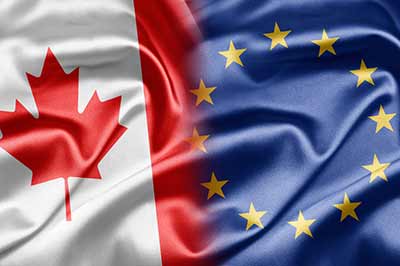The Euro to Canadian Dollar (EUR/CAD) exchange rate recorded gains early in Friday’s European session after German Retail Sales reached higher than forecast levels.
Annual Retail Sales were pulled out of the -1.0% contraction to +4.0%. Economists had expected a smaller 3.6%
Earlier… The Euro to Canadian Dollar (EUR/CAD) exchange rate recorded gains in the second half of Thursday’s European trading after mixed German data and oil price declines.
The price of oil has been weighing on the Canadian Dollar in recent months; so much so, that the Bank of Canada (BOC) instigated a surprise rate cut last week. The benchmark interest rate was downwardly revised from 1.0% where it’s remained for the past four years, to now reside at 0.75%.
The Canadian Dollar has suffered such drastic losses against other currencies that it slipped below 80 US cents in its exchange rate against the US Dollar (CAD/USD), for the first time in six years.
Economist Douglas Porter commented: ‘Just two short years ago to this day, the Canadian Dollar was within a cent of parity, back in the days when oil was trading in the mid-90s and a fellow named Carney was still BoC Governor. Given Wednesday’s latest spillage, the currency has promptly shed 19.5% in that two-year span. That is the largest two-year decline in the Canadian Dollar ever.’
Meanwhile, the Euro advanced against other majors despite a mixed bag of data. Germany’s Unemployment Rate edged lower on Thursday, from the upwardly revised 6.6% to 6.5%.
The number of jobless citizens in Germany slipped by 9,000 to 2.8 million in January, the lowest level since 1990 when the Berlin wall fell.
Analysts at the Federal Labour Office stated: ‘The economic slowdown last summer, which Russia had triggered with its aggression against Ukraine in the spring, has not had any significant impact on German jobs growth. Nor has the introduction of the new national minimum wage of January 1, 2015.’
However, although the labour market is performing well, inflation is falling. The German Consumer Price Index (CPI) entered deflation at -0.3% from +0.2% in January on the year—a result of falling oil prices the world over. Furthermore, it’s the first time German inflation has entered deflation territory since 2009.
Euro to Canadian Dollar (EUR/CAD) Exchange Rate Forecast
The Euro to Canadian Dollar (EUR/CAD) exchange rate could fluctuate significantly during Friday’s European trading with the release of German Retail Sales, Eurozone Unemployment Rate and Consumer Price Index stats.
In addition, Canadian Gross Domestic Product (GDP) ecostats will surface and are likely to be of high influence for the ‘Loonie’. Forecasts expect November’s growth to fall from 2.3% to 2.1% on the year.
The Euro to Canadian Dollar (EUR/CAD) exchange rate is trending in the region of 1.4290. The Canadian Dollar to Euro (CAD/EUR) exchange rate is reaching 0.6992.



